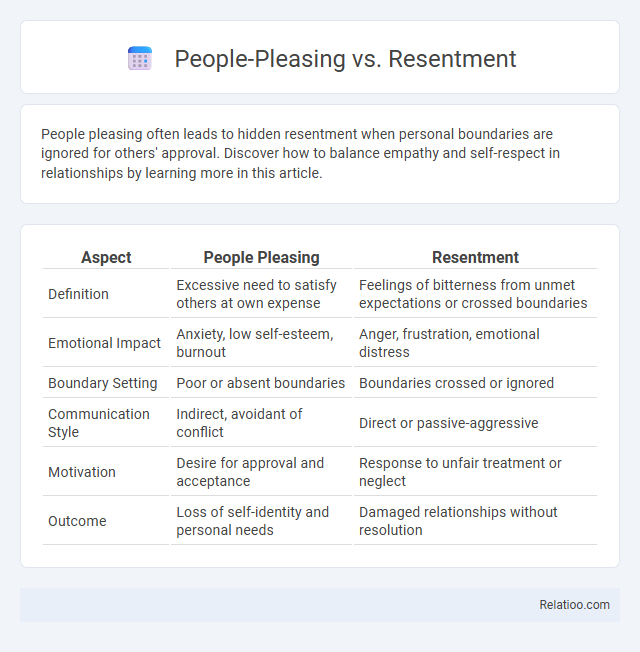People pleasing often leads to hidden resentment when personal boundaries are ignored for others' approval. Discover how to balance empathy and self-respect in relationships by learning more in this article.
Table of Comparison
| Aspect | People Pleasing | Resentment |
|---|---|---|
| Definition | Excessive need to satisfy others at own expense | Feelings of bitterness from unmet expectations or crossed boundaries |
| Emotional Impact | Anxiety, low self-esteem, burnout | Anger, frustration, emotional distress |
| Boundary Setting | Poor or absent boundaries | Boundaries crossed or ignored |
| Communication Style | Indirect, avoidant of conflict | Direct or passive-aggressive |
| Motivation | Desire for approval and acceptance | Response to unfair treatment or neglect |
| Outcome | Loss of self-identity and personal needs | Damaged relationships without resolution |
Understanding People Pleasing: Definition and Origins
People pleasing involves prioritizing others' approval at the expense of your own needs, often rooted in a desire for acceptance and fear of rejection stemming from childhood experiences. This behavior can lead to resentment when personal boundaries are repeatedly ignored or unmet. Understanding the origins of people pleasing helps you recognize patterns that contribute to emotional imbalance and empowers you to establish healthier relationships.
The Psychology Behind People Pleasing
The psychology behind people pleasing stems from a deep-rooted desire for acceptance and fear of rejection, often leading individuals to prioritize others' needs over their own, fostering internal resentment. Chronic people pleasers suppress authentic emotions, creating a buildup of negative feelings that manifest as resentment toward those they seek to please. Understanding this dynamic is crucial for breaking the cycle and achieving emotional balance by setting healthy boundaries and affirming self-worth.
Signs You’re a People Pleaser
Feeling drained after constantly agreeing to others' requests, fearing rejection or conflict, and prioritizing others' needs over your own are key signs you're a people pleaser. You may struggle with setting boundaries, experience difficulty saying no, and often seek approval to maintain harmony. Over time, these behaviors can lead to growing resentment and feelings of being undervalued.
How People Pleasing Leads to Resentment
People pleasing often causes you to suppress your own needs and desires to gain approval, which builds unspoken frustration over time. This ongoing disregard for personal boundaries fosters resentment, as unmet expectations fuel feelings of being undervalued or exploited. Understanding the link between people pleasing and resentment is crucial for reclaiming your emotional well-being and setting healthy limits.
The Emotional Cost of Chronic People Pleasing
Chronic people pleasing often leads to deep-seated resentment as individuals suppress their own needs and desires to satisfy others, creating emotional exhaustion and inner conflict. This ongoing sacrifice of personal boundaries fosters a cycle of unacknowledged frustration, eroding self-esteem and contributing to anxiety or depression. Understanding the emotional cost of people pleasing is essential for breaking free from resentment and fostering healthier, more authentic relationships.
Recognizing Resentment in Relationships
Recognizing resentment in relationships involves identifying feelings of anger, bitterness, or frustration that stem from unmet needs or unexpressed emotions, often hidden beneath a facade of people-pleasing behavior. Your ability to distinguish between genuine kindness and people-pleasing driven by fear of conflict is crucial for maintaining emotional health and authentic connections. Understanding these dynamics helps prevent resentful patterns from undermining trust and communication in your relationships.
Setting Healthy Boundaries to Break the Cycle
Setting healthy boundaries is essential to breaking the cycle between people pleasing and resentment, as it empowers individuals to assert their needs without fear of rejection. Clear limits prevent overcommitment and reduce built-up frustration, fostering self-respect and emotional well-being. Consistently practicing boundary-setting helps develop authentic relationships based on mutual respect rather than obligation or guilt.
Strategies for Overcoming People Pleasing Tendencies
Overcoming people pleasing tendencies involves setting clear personal boundaries to protect your emotional well-being and practicing assertive communication to express your needs confidently. Developing self-awareness through mindfulness can help you recognize when you're prioritizing others at the expense of yourself, reducing the buildup of resentment. Cultivating self-compassion enables you to value your own feelings, preventing resentment from festering and empowering you to say no without guilt.
Cultivating Self-Compassion and Assertiveness
People pleasing often leads to resentment when personal needs are consistently suppressed to satisfy others, creating internal conflict and emotional exhaustion. Cultivating self-compassion involves recognizing and valuing one's own feelings and boundaries without self-judgment, which fosters emotional resilience. Developing assertiveness skills empowers individuals to communicate needs and set healthy limits effectively, reducing resentment and promoting balanced relationships.
Building Balanced, Authentic Connections
People pleasing often leads to resentment when your authentic needs are consistently sacrificed to satisfy others, causing emotional imbalance. Establishing balanced, authentic connections requires you to prioritize honest communication and set healthy boundaries that respect both your feelings and those of others. This approach fosters mutual respect and prevents the buildup of hidden resentment, creating deeper and more genuine relationships.

Infographic: People Pleasing vs Resentment
 relatioo.com
relatioo.com